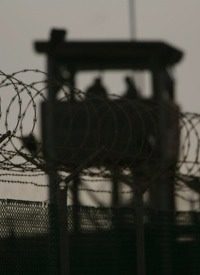
The U.S. government has charged al-Nashiri with war crimes related to his alleged role in the suicide bombing of the USS Cole in 2000, an attack that killed 17 sailors. The defendant is additionally charged with the bombing of a French merchant vessel in 2002, and a planned attack on the American naval warship the USS The Sullivans, also in 2000.
Guarded by an escort of American servicemen, al-Nashiri entered the courtroom dressed in his white prison jumpsuit. He was clean-shaven and wearing his hair very short.
Sitting at a table flanked by his cohort of defense attorneys, al-Nashiri appeared confident, smiling occasionally and at one point waving to the media and other observers sitting behind a glass barrier.
The arraignment of al-Nashiri is historic in that it is the first of such tribunals to be held since the system was created during the George W. Bush administration in response to the attacks of September 11, 2001. The proceeding is especially noteworthy in that not only is it the first military tribunal of a Guantanamo prisoner, but, if convicted, al-Nashiri faces the death penalty.
Wearing headphones to hear Arabic interpretations of the questions put to him, al-Nashiri declined to enter a plea and informed the presiding officer that he was satisfied with the quality of his defense counsel and that he understood the nature of the charges being brought against him.
Al-Nashiri is charged with war crimes and murder relating to the above-mentioned terrorist activities.
Upon al-Nashiri’s refusing to enter a plea, Richard Kammen, lead attorney for the defendant, posed a series of questions (known as voir dire) to the judge, Colonel James L. Pohl. While such questions are not permitted under the federal rules of civil procedure, they are allowed at this trial as the Uniform Code of Military Justice is being followed.
The principal issues raised by Kammen in the questions he posed to Judge Pohl were first, whether Pohl believed that the rules established for these commissions conformed to the American sense of fairness; and second, whether al-Nashiri’s treatment while in the custody of the United States was just and conducive to a fair hearing on the charges.
Colonel Pohl declined to offer his personal opinion on the matters raised by Kammen, choosing instead to commit to applying the rules of procedure fairly according to the guidelines set forth in the applicable provisions of the Military Commissions Act of 2009 (and the associated enabling Department of Defense regulation).
As reported in an earlier story published by The New American, al-Nashiri’s legal counsellors intend to produce evidence that their client was tortured severely while being held by the CIA (including during detention in secret facilities outside the United States). This brutal treatment on the part of the U.S. government should be viewed as a mitigating factor sufficient to disqualify the defendant from facing the death penalty.
As chronicled earlier this week:
In November 2002, al-Nashiri was captured in the United Arab Emirates by the Central Intelligence Agency’s Special Activities Division. After being held and interrogated at one of the CIA’s infamous rendition facilities (where he was waterboarded and questioned at gunpoint and threatened with a power drill), al-Nashiri was transferred to the Guantanamo Bay prison, where he remains to this day.
Documents obtained as result of a Freedom of Information Act request made by the American Civil Liberties Union indicate that while in the custody of the CIA (which reportedly included time in a “black site” prison north of Warsaw, Poland), al-Nashiri was subject to inhuman torture tactics that led him to sign a confession admitting to having participated in the planning of the attack on the USS Cole.
In addition to the relevant issues of coercion and hearsay regarding the evidence to be presented by the prosecution, Kammen and his colleagues will likely challenge the jurisdiction of the military tribunal to hear the case against their client. According to the laws establishing the military commissions, they are granted very limited jurisdiction: to try war crimes.
The crimes with which al-Nashiri is charged by the United States were committed before the “War on Terror” was officially begun by the enactment of the Authorization to Use Military Force. That is to say, no war crime can be committed during a time when there is no war; therefore, the military commission has no legal authority to hear the case against al-Nashiri or any other prisoner in similar circumstances.
Additionally, there are federal courts where questions of jurisdiction would not be an issue and where problems with unusual procedures would not arise. For this reason, many argue that al-Nashiri and his fellow “high-value detainees” should be tried in federal court and not by a military commission with disputable jurisdiction and untested rules of procedure.
After accepting al-Nashiri’s decision to postpone entering a plea, Judge Pohl ruled on three motions filed by the defense.
The first motion dealt with whether or not the hearing itself was a farce in light of the fact that the government has stated that even if al-Nashiri is acquitted of the charges he is facing, he will remain in custody until the conclusion of the “war” against al-Qaeda. The government insists that if al-Nashiri were acquitted and then released, he may return to the “battlefield” to rejoin his comrades in al-Qaeda (an association that the government has alleged, but never bothered to prove).
Judge Pohl provisionally denied the motion, but reserved the right to permit the defense to file an amended pleading should the issue become more timely.
The second motion ruled upon by the court dealt with the calling of expert assistance. Kammen expressed concern that were the prosecution to learn of the details of such requests made by the defense team, their case could be compromised and their “work product” unfairly obtained by the government.
The third and final motion touched upon the issue of attorney-client privilege. In the brief accompanying the motion, Kammen argued that he believed the government was reading mail sent by Kammen and his colleagues to their client. After hearing oral arguments, the judge laid out guidelines for handling the type of mail in question. First, all mail sent between lawyer and client should be marked. The government may inspect the mail to check for the appropriate markings. If mail is found by the government to lack the agreed-upon markings, it may be seized.
After all the motions were dealt with by Judge Pohl, he announced the date upon which the trial of al-Nashiri would begin: November 9, 2012. This date was set pending the accused’s waiving of his right to a speedy trial as set forth in § 707(a)(3) and (c) (8) of the Uniform Code of Military Justice. Al-Nashiri waived that right and the order was entered.
Upon leaving the courtroom, Kammen and Lt. Commander Stephen Reyes, one of al-Nashiri’s military lawyers, addressed the media and other observers. Kammen described the day’s events as “very, very interesting” and expressed his opinion that the system of military commissions as established was “hopelessly unfair.”
The lead prosecutor, Brigadier General Mark Martins, followed the defense’s statement with remarks recalling the history of military tribunals, the fact that the United States is involved in an “armed conflict,” and the fact that the U.S. government is devoted to faithfully adhering to the “rule of law.”
Photo of Guantanamo: AP Images


